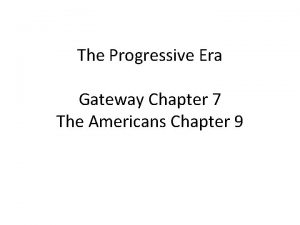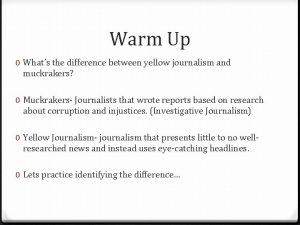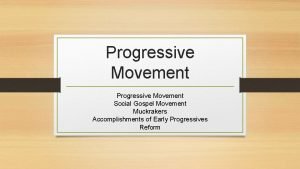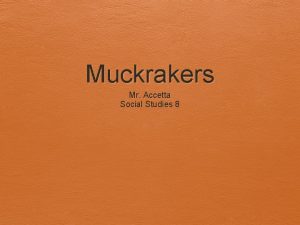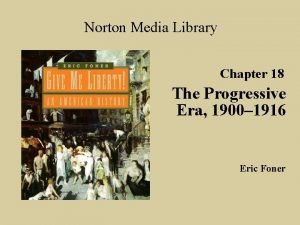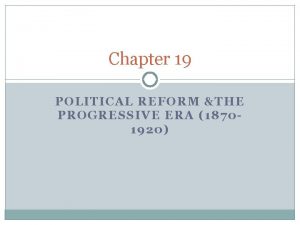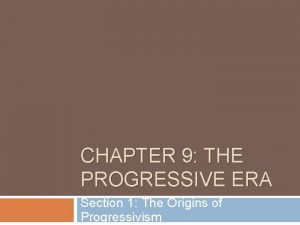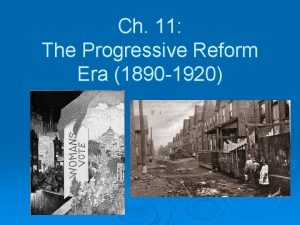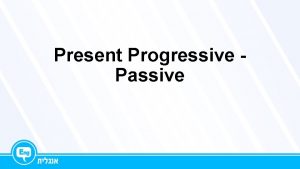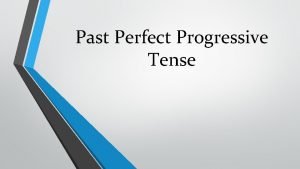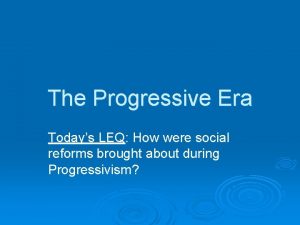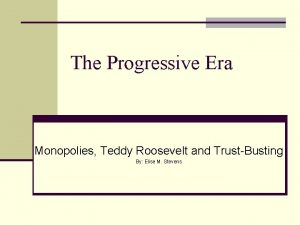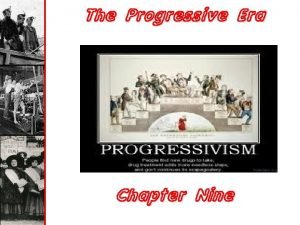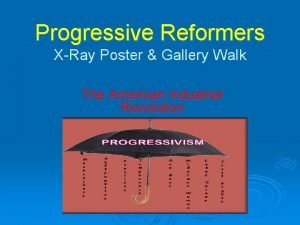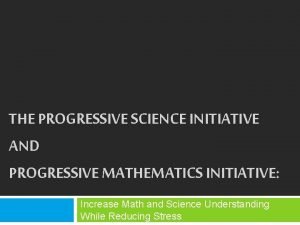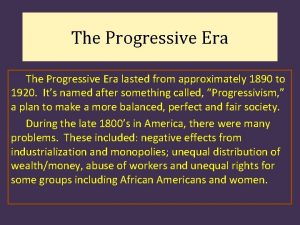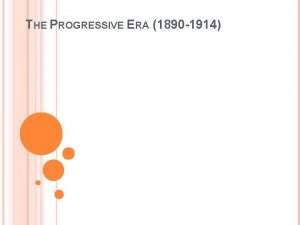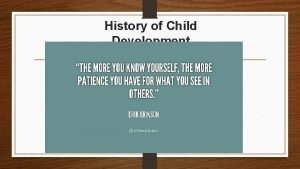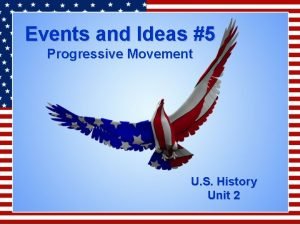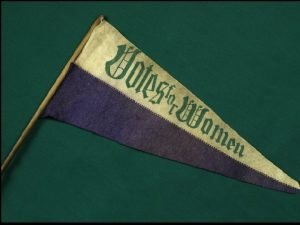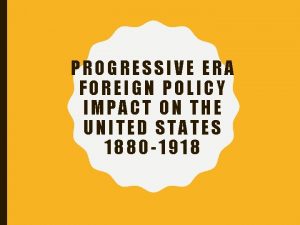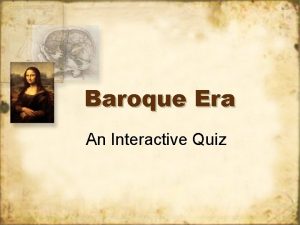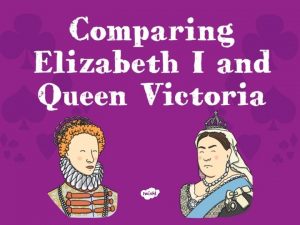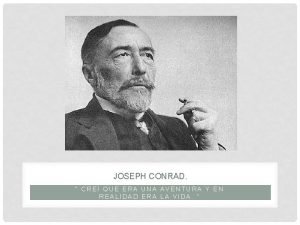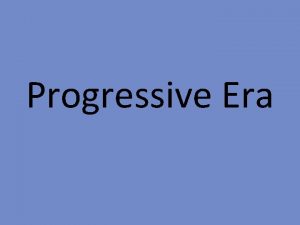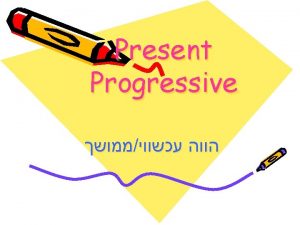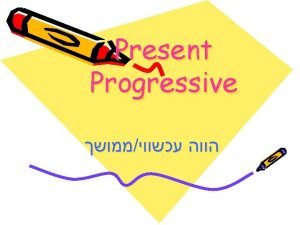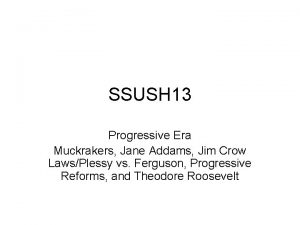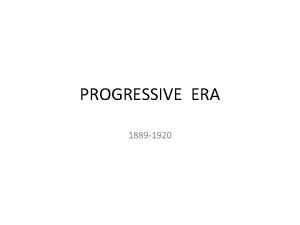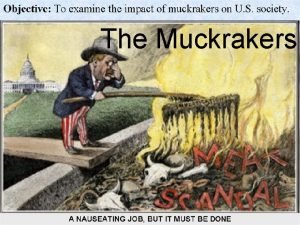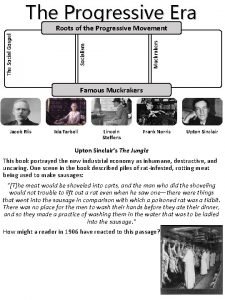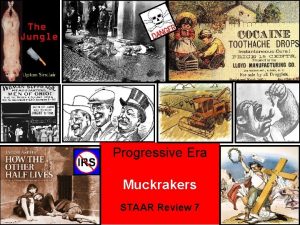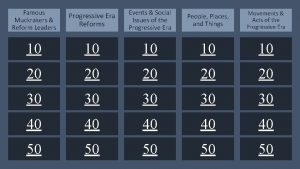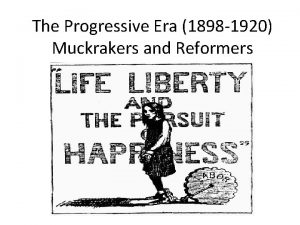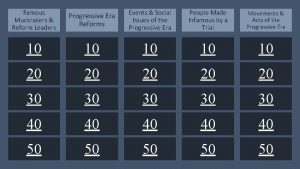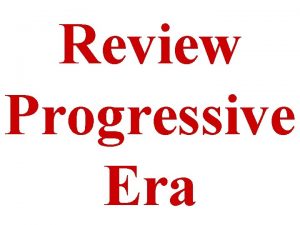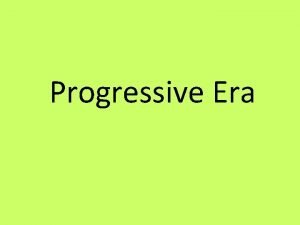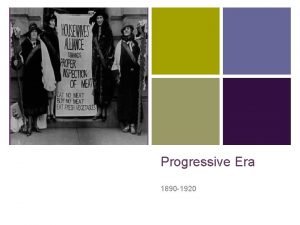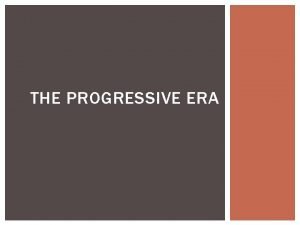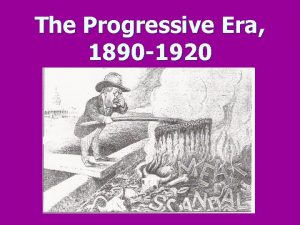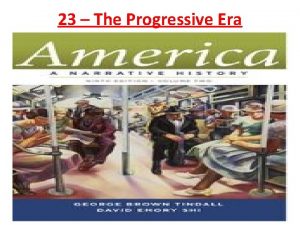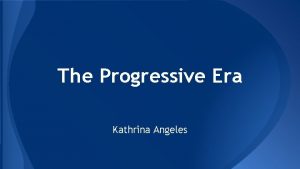The Progressive Era US History Chapter 17 Muckrakers




























- Slides: 28

The Progressive Era US History Chapter 17

Muckrakers / Lincoln Steffens Muckrakers - Socially conscious journalists and other writers who uncovered a wide-range of problems in American society. Their articles, appearing in newspapers and magazines nationwide, shocked angered mainstream Americans, creating the social environment conducive to the Progressive movement. Ø Lincoln Steffens – Editor of Mc. Clure’s Magazine and leading muckraker; Steffens published The Shame of the Cities, exposing political corruption. Ø Closure Question #1: What problems did muckrakers expose and what effects did their work have on Progressive reform? (At least 2 problems and 1 sentence)

Jacob Riis Ø Influential muckraker and photographer for the New York Evening Sun; Riis published a collection of photographs portraying life in the crowded, unsafe, rat-infested tenement buildings of inner-city New York in a book entitled How the Other Half Lives which shocked the nation’s conscience and led to reform. Closure Question #1: What problems did muckrakers expose and what effects did their work have on Progressive reform? (At least 2 problems and 1 sentence)

The Jungle / Upton Sinclair Ø Published in 1906 by muckraker Upton Sinclair, The Jungle opened American’s eyes to the terrible working conditions for workers in the Chicago meat industry and the amount of contaminants, including rat poison and dung, which infested American meat. The novel led Congress & President Theodore Roosevelt to pass the Meat Inspection Act in 1906.

Social Gospel Ø First presented by Baptist minister Walter Rauschenbusch; states that by following the Bible’s teachings about charity and justice people could make society “the kingdom of God”. Closure Question #2: Describe Walter Rauschenbusch’s ideas about Social Gospel and the Progressive Movement. (At least 1 sentence)

Settlement House / Jane Addams Settlement House – A Community Center that provided social services to the urban poor; Workers gave mothers classes on child care, taught English to immigrants, ran nursery schools & kindergartens for children and provided theater, art, and dance programs for adults. Jane Addams – Founder of Hull House in Chicago in 1889, one of the first settlement houses in America; Her work inspired other middle-class women to become social workers, leading to the establishment of more than 400 settlement houses in the United States by 1911.

Direct Primary / Initiative Direct Primary – An election in which citizens vote to select nominees for upcoming elections; thanks to the work of Progressives by 1916, all but 4 states had direct primaries. Ø Initiative – Progressive political reform which gives citizens the power to put a proposed new law directly on the ballot in the next election by collecting citizens’ signatures on a petition. Ø Closure Question #3: Which groups in American society might have opposed Progressive reform? Explain. (At least 1 sentence)

Referendum / Recall Referendum – Progressive political reform which allows citizens to approve or reject laws passed by a legislature. Ø Recall – Gives voters the power to remove public servants from office before their term has ended. Ø Closure Question #3: Which groups in American society might have opposed Progressive reform? Explain. (At least 1 sentence)

Closure Assignment #4 Based on the material covered from Chapter 17, Section 1, answer the following questions: 1. What problems did muckrakers expose and what effects did their work have on Progressive reform? (At least 2 problems and 1 sentence) 2. Describe Walter Rauschenbusch’s ideas about Social Gospel and the Progressive Movement. (At least 1 sentence) 3. Which groups in American society might have opposed Progressive reform? Explain. (At least 1 sentence) Ø

Florence Kelley / Margaret Sanger Florence Kelley – Founder of the National Consumers League (NCL) in 1889; Kelley established the NCL to urge women to buy products that were produced under fair and safe working conditions at a fair price and avoid buying products that were produced using unsafe or unsanitary methods. Ø Margaret Sanger – Believing that family life and women’s healthy would improve if mothers had fewer children, Sanger opened America’s first birthcontrol clinic in 1916 and, in 1921, founded the American Birth Control League to make birth control information available to women across the country. Ø Closure Question #1: Why would education have led middle-class women to address societal problems? (At least 1 sentence)

Carrie Chapman Catt / Alice Paul Carrie Chapman Catt –President of the NAWSA (National American Woman Suffrage Association) beginning in 1900; Catt’s political efforts, including the referendum process, & social efforts, recruiting wealthy & well-educated women to the cause, were keys in winning the right to vote for women in 1919. Ø Alice Paul – Social Activist in the women’s rights movement in the early 1900 s; Paul formed the National Woman’s Party (NWP) in 1917 to organize protest marches for suffrage. The NWP was the 1 st group to march with picket signs outside the White House, and hundreds of women were arrested in protests. Ø Closure Question #2: Choose one specific social problem and explain how Progressive women reformers proposed to solve that problem. (1 sentence)

th 19 Ø Amendment Approved by Congress in June 1919 and State Legislatures in August 1920; The 19 th Amendment states that “the right to vote shall not be denied or abridged on account of sex. ”, officially giving women in the United States the right to vote. Closure Question #3: How did suffragists’ efforts at the state level affect their effort to win the right to vote at the national level? (At least 1 sentence)

Closure Assignment #5 Based on the material covered from Chapter 17, Section 2, answer the following questions: 1. Why would education have led middle-class women to address societal problems? (At least 1 sentence) 2. Choose one specific social problem and explain how Progressive women reformers proposed to solve that problem. (At least 1 sentence) 3. How did suffragists’ efforts at the state level affect their effort to win the right to vote at the national level? (At least 1 sentence) Ø

Niagara Movement / NAACP Niagara Movement – Group of African Americans opposed to discrimination established by W. E. B. Dubois and William Monroe Trotter in 1905; the group attacked Booker T. Washington’s willingness to compromise the rights of African Americans. The movement had a great influence on the formation of the NAACP. Ø NAACP (National Association for the Advancement of Colored People) – Est. in 1909 & led by white & black progressives, including Addams, Kelley, & Dubois; The NAACP aimed to help African Americans “be physically free from low-paid labor, mentally free from ignorance, politically free from disfranchisement, & socially free from insult. ” Ø

Closure Question #1: How did Progressives’ views about race and values foster prejudice? (At least 1 sentence) Many Progressives shared the same prejudice against nonwhites held by other white Americans of the time. They believed that some people were more fit that others to play a leading role in society. They agreed with socalled scientific theories that said that dark skinned peoples had less intelligence than whites. In the late 1800 s, southern Progressives used these misguided theories to justify the passage of laws that kept African Americans from voting. Some southern Progressives urged an end to the violence and terrorism waged against African Americans. Ø Edgar Gardner Murphy, an Episcopal minister and a leading Alabama Progressive, advised that African Americans “will accept in the white man’s country the place assigned him by the white man… not by stress of rivalry, but by genial cooperation with the white man’s interests. After the Supreme Court issued its Plessy v. Ferguson decision, states across the North and the South had passed segregation laws. By 1910, segregation was the norm across the nation. After 1914, even the offices of the federal government in Washington D. C. were segregated as a result of policies approved by President Woodrow Wilson, a Progressive. Ø

Urban League Ø Established in 1911 as an association of clubs and churches that helped African Americans settle and find work in America’s cities; the Urban League helped families buy clothes and books and send children to school while helping factory workers and maids find jobs. Closure Question #2: What do the differing approaches of Booker T. Washington and W. E. B. Du Bois suggest about their views of American society? (At least 2 sentences)

Anti-Defamation League Ø Anti-Defamation League – Established in 1913 by Jews in New York in response to growing anti-Semitism. Its goal was and is to defend Jews and others against physical and verbal attacks, false statements, and “to secure justice and fair treatment to all citizens alike…” Closure Question #3: Were the goals and actions of the mutualistas more similar to the of the Urban League or to those of the Anti-Defamation League? Explain. (At least 1 sentence)

Mutualistas Ø Groups of Mexican Americans formed in several states which made loans, provided legal assistance and provided health insurance to needy families. Closure Question #3: Were the goals and actions of the mutualistas more similar to the of the Urban League or to those of the Anti-Defamation League? Explain. (At least 1 sentence)

Closure Assignment #6 Based on the material covered from Chapter 17, Section 3, answer the following questions: 1. How did Progressives’ views about race and values foster prejudice? (At least 1 sentence) 2. What do the differing approaches of Booker T. Washington and W. E. B. Du Bois suggest about their views of American society? (At least 2 sentences) 3. Were the goals and actions of the mutualistas more similar to the of the Urban League or to those of the Anti-Defamation League? Explain. (At least 1 sentence) Ø

Theodore Roosevelt / Square Deal Theodore Roosevelt – Republican President from 1901 to 1909; Roosevelt was Vice-President to William Mc. Kinley in the election of 1901 and became President as a result of Mc. Kinley’s assassination. Previously he had served as Governor of New York & led American forces in Cuba during the Spanish. American War. He was only 43 years old when he became President and was the first Progressive President. Ø Square Deal – Phrase coined by Roosevelt to describe his political policy; Roosevelts goals were to keep the wealthy and powerful from taking advantage of small businesses owners and the poor. Ø Closure Question #1: What impact did Roosevelt’s actions have on the government’s role in the economy? (At least 1 sentence)

Hepburn Act Ø Reform act supported by Roosevelt and passed by Congress in 1906; the Hepburn Act gave the ICC the authority to set and limit shipping costs and set maximum prices for ferries, bridge tolls, and oil pipelines. Closure Question #1: What impact did Roosevelt’s actions have on the government’s role in the economy? (At least 1 sentence)

Meat Inspection Act / Pure Food & Drug Act Meat Inspection Act – Reform passed in 1906 following the publication of The Jungle by Upton Sinclair; The act provided federal agents to inspect any meat sold across state lines and required federal inspection of meat-processing plants. Ø Pure Food & Drug Act – Reform passed in 1906 which provided federal agents to inspect foods and medicines sold across state lines and banned the interstate shipment of impure food & the mislabeling of food and drugs. Ø Closure Question #1: What impact did Roosevelt’s actions have on the government’s role in the economy? (At least 1 sentence)

Gifford Pinchot / National Reclamation Act Gifford Pinchot – Leader of the Division of Forestry in the U. S. Department of Agriculture during Roosevelt’s presidency; Pinchot believed that forests should be preserved for public use, meaning that forests should be protected so that trees would have time to mature into good lumber. Ø National Reclamation Act – Reform passed in 1902 which gave the federal government the power to decide where and how water would be distributed. Ø Closure Question #2: How did Theodore Roosevelt’s national forest policy reflect his ideas about conservation and preservation? (At least 1 sentence)

New Nationalism / Progressive Party New Nationalism – Roosevelt’s program to restore the government’s trustbusting power in 1911; Roosevelt began the program after a disagreement with his successor as President, William H. Taft. Ø Progressive Party – Political party established in 1912 branching off from the Republican Party; Progressives left the Republican Party as a result of the disagreement between President Taft and Roosevelt and nominated Theodore Roosevelt as their candidate for President. Ø Closure Question #3: How were the goals and actions of Wilson’s New Freedom similar to Roosevelt’s New Nationalism? How were they different? (At least 2 sentences)

Woodrow Wilson / New Freedom Woodrow Wilson – Progressive Democratic President from 1913 to 1921; with the support of Congress, Wilson lowered tariffs, enacted a graduated income tax, supported the Federal Reserve Act and Trade Commission, lead the United States during World War I and helped create the League of Nations. Ø New Freedom – Wilson’s political reform program which aimed to place government controls on corporations and provide more opportunities for small businesses. Ø Closure Question #3: How were the goals and actions of Wilson’s New Freedom similar to Roosevelt’s New Nationalism? How were they different? (At least 2 sentences)

16 th Amendment / Federal Reserve Act 16 th Amendment – Passed in 1913, the amendment gave Congress the power to establish a graduated income tax, which is a tax in which the wealthy pay a higher percentage of their income than do poor people. Ø Federal Reserve Act – Passed in 1913, this law placed national banks under the control of a Federal Reserve Board, which a) set up regional banks to hold reserve funds for commercial banks, b) sets the interest rate that banks pay to borrow money from other banks and c) supervises banks to make sure they are well run. Ø

Federal Trade Commission / Clayton Antitrust Act Federal Trade Commission – Created by Congress in 1914, members of this group monitor business practices that might lead to monopoly and watches out for false advertising or dishonest labeling on products sold in the United States. Ø Clayton Antitrust Act – Passed in 1914; strengthened earlier antitrust laws by spelling out specific actions businesses could not do. Ø

Closure Assignment #7 Based on the material covered from Chapter 17, Sections 4 & 5, answer the following three questions in Box #4 of your closure sheet: 1. What impact did Roosevelt’s actions have on the government’s role in the economy? (At least 1 sentence) 2. How did Theodore Roosevelt’s national forest policy reflect his ideas about conservation and preservation? (At least 1 sentence) 3. How were the goals and actions of Wilson’s New Freedom similar to Roosevelt’s New Nationalism? How were they different? (At least 2 sentences) Ø
 Gateway to us history chapter 7 the progressive era
Gateway to us history chapter 7 the progressive era John muir muckraker
John muir muckraker Muckrakers accomplishments
Muckrakers accomplishments Muckrakers webquest
Muckrakers webquest Chapter 18 the progressive era
Chapter 18 the progressive era Chapter 19 political reform and the progressive era
Chapter 19 political reform and the progressive era Chapter 9 the progressive era section 1 answers
Chapter 9 the progressive era section 1 answers Chapter 11 the progressive reform era
Chapter 11 the progressive reform era Present progressive passive examples
Present progressive passive examples Affirmative past progressive
Affirmative past progressive Functions of past tense
Functions of past tense Progressive era leq
Progressive era leq Progressive era muckraker tarbell
Progressive era muckraker tarbell Progressive era monopolies
Progressive era monopolies Progressive era dbq answers
Progressive era dbq answers Progressive era posters
Progressive era posters Paradigm shift in technology
Paradigm shift in technology The progressive era lasted from
The progressive era lasted from When was the progressive era? *
When was the progressive era? * John dewey progressive era
John dewey progressive era Progressive era worksheets
Progressive era worksheets Anne dallas dudley
Anne dallas dudley Dollar diplomacy pros and cons
Dollar diplomacy pros and cons The wizard of oz: parable on populism
The wizard of oz: parable on populism Https://play.kahoot.it
Https://play.kahoot.it Quiz 2 the baroque era
Quiz 2 the baroque era Elizabethan era vs victorian era
Elizabethan era vs victorian era Creí que era una aventura y en realidad era la vida
Creí que era una aventura y en realidad era la vida Poema sobre as estrelas
Poema sobre as estrelas
